RAGE/AGER Products
RAGE (Receptor for Advanced Glycation End product) is a transmembrane glycoprotein that binds advanced glycation end products (AGEs), beta-amyloid peptides, HMGB1/Amphoterin, and several S100 family proteins. AGEs are adducts formed by the non-enzymatic glycation and oxidation of proteins and lipids. A soluble form can also be generated by MMP-m...
245 results for "RAGE/AGER" in Products
245 results for "RAGE/AGER" in Products
RAGE/AGER Products
RAGE (Receptor for Advanced Glycation End product) is a transmembrane glycoprotein that binds advanced glycation end products (AGEs), beta-amyloid peptides, HMGB1/Amphoterin, and several S100 family proteins. AGEs are adducts formed by the non-enzymatic glycation and oxidation of proteins and lipids. A soluble form can also be generated by MMP-m...
| Reactivity: | Human, Mouse, Rat |
| Details: | Goat IgG Polyclonal |
| Applications: | WB, IHC, Block |
Control for use with Human RAGE/AGER Simple Plex Cartridge Kit
| Applications: | Ctrl, Simple Plex |
| Reactivity: | Human |
| Details: | Mouse IgG2b Monoclonal Clone #176902 |
| Applications: | WB, Block |
| Reactivity: | Mouse |
| Details: | Rat IgG2a Monoclonal Clone #697023 |
| Applications: | WB, Flow, CyTOF-ready |
| Reactivity: | Mouse |
| Details: | Rat IgG2a Monoclonal Clone #697023 |
| Applications: | Flow |
| Sensitivity: | 16.14 pg/mL |
| Applications: | ELISA |
| Assay Range: | 78 - 5,000 pg/mL (Cell Culture Supernates, Serum, EDTA Plasma, Heparin Plasma) |
| Reactivity: | Mouse, Rat |
| Details: | Rat IgG2a Monoclonal Clone #175410 |
| Applications: | WB, IHC |
Simple Plex Human RAGE/AGER assay kit for use on Ella instrument. Contains cartridge, sample diluent SD06, and wash buffer.
| Applications: | Simple Plex |
Create your custom Simple Plex cartridge for up to 8 targets. Choose from more than 250 targets across multiple species.
| Sensitivity: | 4.81 pg/mL |
| Applications: | ELISA |
| Assay Range: | 31.3 - 2,000 pg/mL (Cell Culture Supernates, Tissue Lysates, Serum, EDTA Plasma, Heparin Plasma, Urine) |
| Reactivity: | Human, Mouse, Rat |
| Details: | Goat IgG Polyclonal |
| Applications: | WB, IHC, Block |
Simple Plex Cartridge Kit for quantitation of RAGE. Includes wash buffer and sample diluent. For use with the Ella automated immunoassay system.
Create your custom Simple Plex cartridge for up to 8 targets. Choose from more than 250 targets across multiple species.
| Assay Range: | 62.5 - 4,000 pg/mL |
| Applications: | ELISA |
| Source: | NS0 |
| Accession #: | Q15109 |
| Applications: | Bind |
| Assay Range: | 31.2 - 2,000 pg/mL |
| Applications: | ELISA |
| Assay Range: | 125 - 8,000 pg/mL |
| Applications: | ELISA |
| Reactivity: | Human |
| Details: | Mouse IgG1 Monoclonal Clone #176907 |
| Applications: | WB, IHC |
| Reactivity: | Mouse |
| Details: | Rat IgG2a Monoclonal Clone #697023 |
| Applications: | Flow |
| Source: | NS0 |
| Accession #: | O35444 |
| Applications: | Bind |
| Reactivity: | Canine |
| Details: | Sheep IgG Polyclonal |
| Applications: | WB |
Recombinant Monoclonal Antibody.
| Reactivity: | Human, Mouse, Rat |
| Details: | Rabbit IgG Monoclonal Clone #JF0975 |
| Applications: | IHC, WB, Flow |
For use with catalog numbers DRG00, SRG00, PDRG00
| Applications: | ELISA, Ctrl |
RAGE antagonist
| Purity: | ≥95% (HPLC) |
| Reactivity: | Rat |
| Details: | Goat IgG Polyclonal |
| Applications: | WB, Block |
| Reactivity: | Mouse |
| Details: | Rat IgG2a Monoclonal Clone #175409 |
| Applications: | WB |

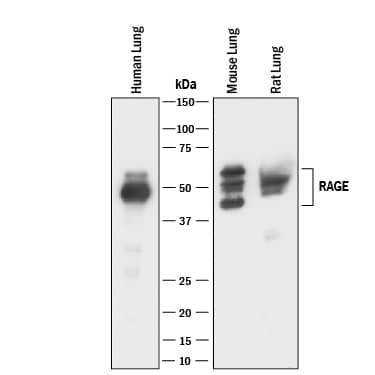

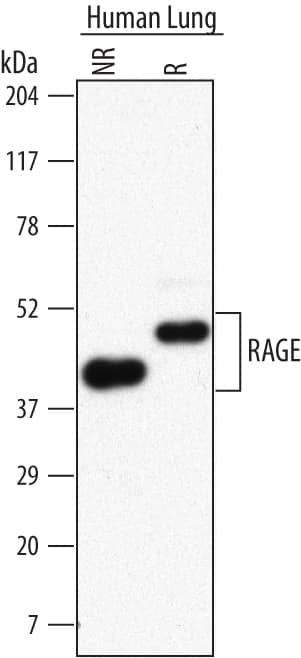

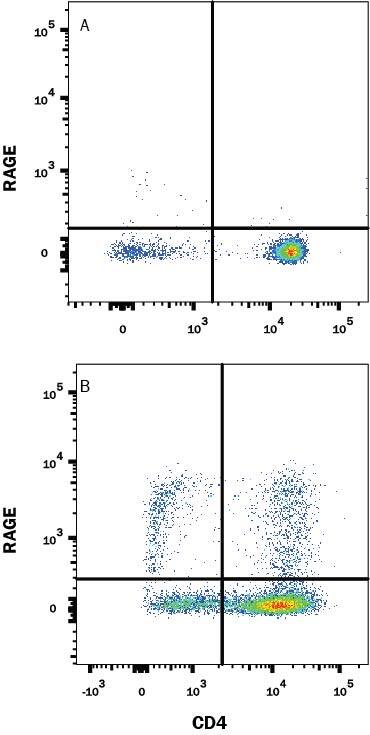
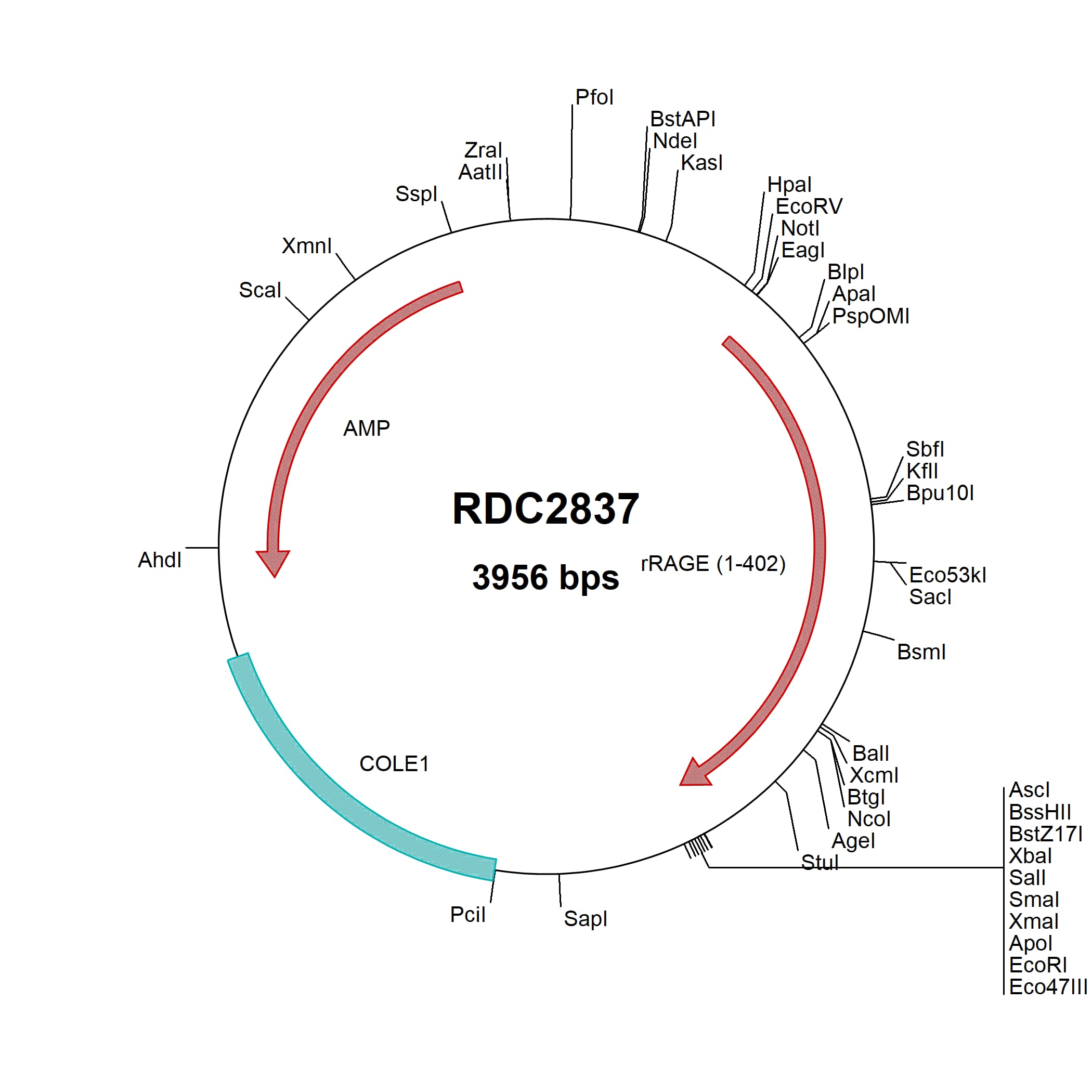

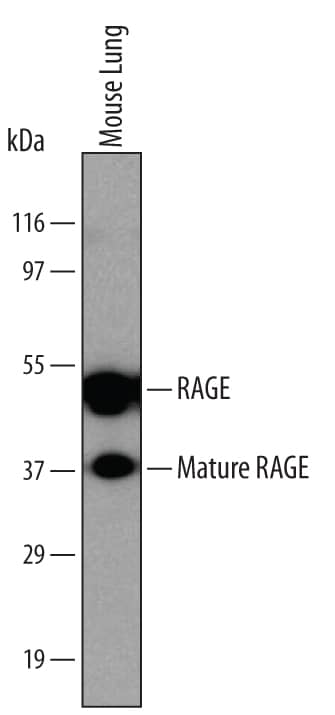
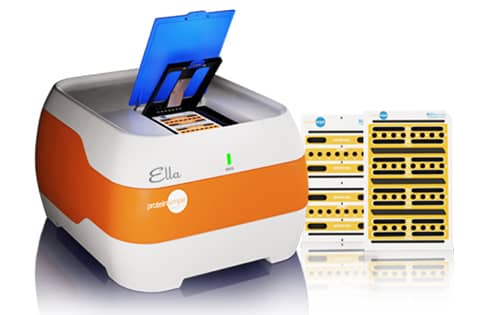

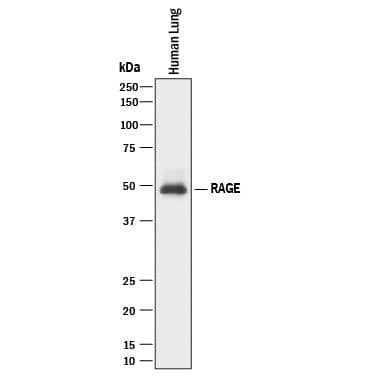





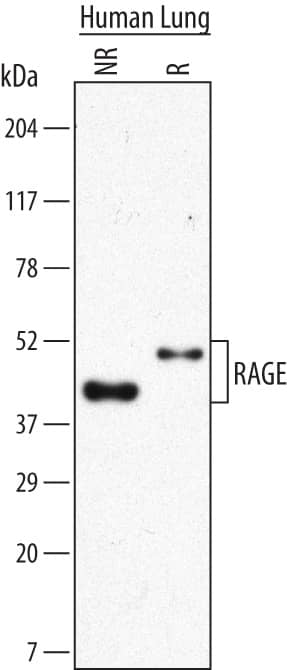

![Western Blot: AGER Antibody (JF0975) [NBP2-67095] Western Blot: AGER Antibody (JF0975) [NBP2-67095]](https://resources.bio-techne.com/images/products/AGER-Antibody-JF0975-Western-Blot-NBP2-67095-img0005.jpg)


